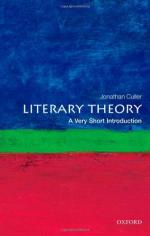
|
| Name: _________________________ | Period: ___________________ |
This test consists of 5 multiple choice questions, 5 short answer questions, and 10 short essay questions.
Multiple Choice Questions
1. Who asserts that the interpretation of metaphor is often reliant upon another metaphor?
(a) Shakespeare.
(b) Marlowe.
(c) Socrates.
(d) Derrida.
2. According to Chapter 5, why is rhythm important to a poem?
(a) It creates mystery.
(b) It draws in the reader.
(c) It repels the reader.
(d) It confuses the reader.
3. Poetry has the capability to influence what in its reader, according to Culler?
(a) Great joy.
(b) Overwhelming empathy.
(c) All of these.
(d) Intense sorrow.
4. In literature, what is it called when events take place opposite of expectation?
(a) Irony.
(b) Flashback.
(c) Alliteration.
(d) Point of view.
5. Culler reports that the use of a genre can do what for a reader?
(a) Limit reading ability.
(b) Inspire creativity.
(c) Falsify facts.
(d) Create expectation.
Short Answer Questions
1. According to some theorists, what idea was created by literature?
2. According to Nancy Armstrong, feelings and personal qualities in characters became more important than _____________.
3. According to Culler, what is a classic ideal that appears in many novels?
4. Culler suggests that performative language aids is the understanding of ______________.
5. Theorists occasionally worry about the impact of literature because narratives can be a trusted source of knowledge or _________.
Short Essay Questions
1. What is the role of the narrator limited?
2. Why do some theorists believe that popular characterizations in novels create bad influences?
3. Who created a portrait of the "modern individual"?
4. According to Chapter 8, in terms of the "I," what do literary theorists debate?
5. According to Chapter 5, genre is very important to a reader. Why?
6. According to Chapter 7, what is accomplished by attempting to identify literary performatives?
7. How does a rhetorical figure use language in poetry?
8. According to Chapter 5, what is rhetoric?
9. What is poetics, as explained by "Chapter 5, Rhetoric, Poetics, and Poetry"?
10. According to theorists, what gives the reader the most pleasure when reading a novel?
|
This section contains 529 words (approx. 2 pages at 300 words per page) |

|




